Answered step by step
Verified Expert Solution
Question
1 Approved Answer
BFA714 Australian Tax Law Assignment 1 (individual) DUE DATE: Friday 28th August at 5pm CLIENT INFORMATION: General Facts: Scott Wright is 36 years old and
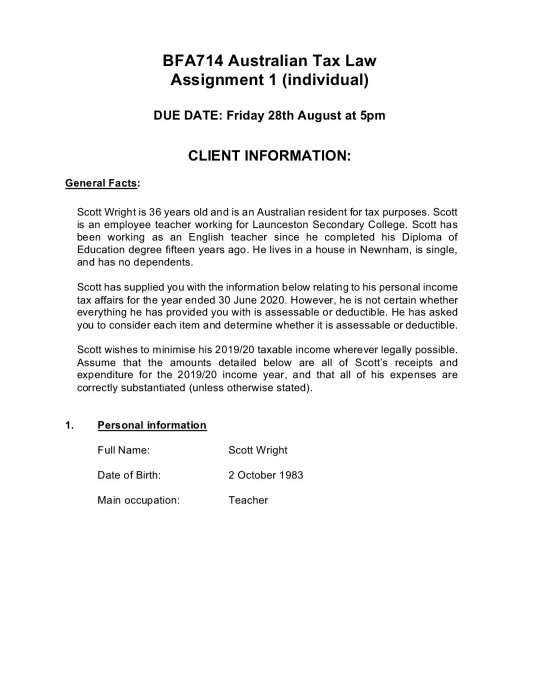
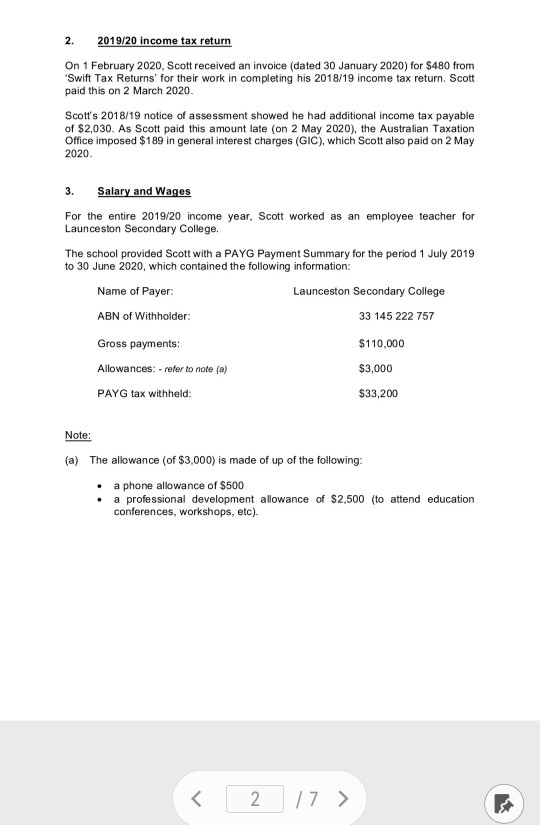
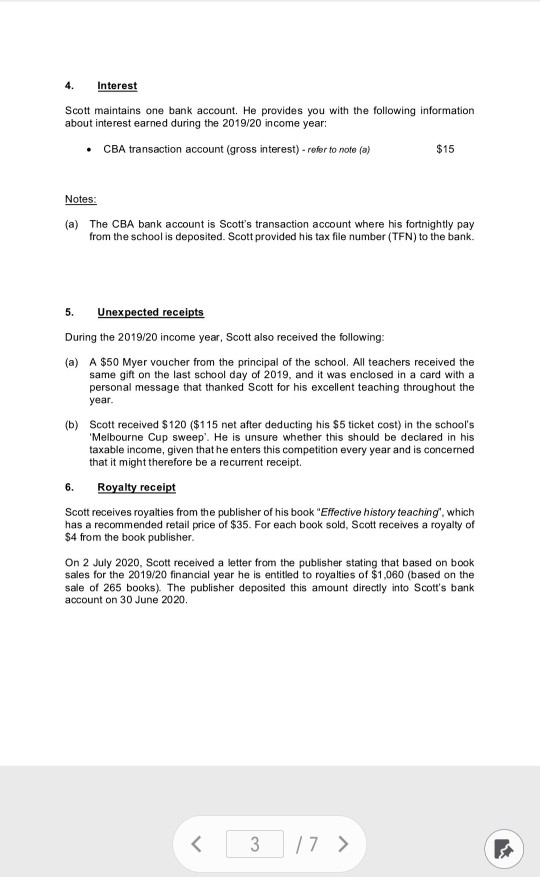
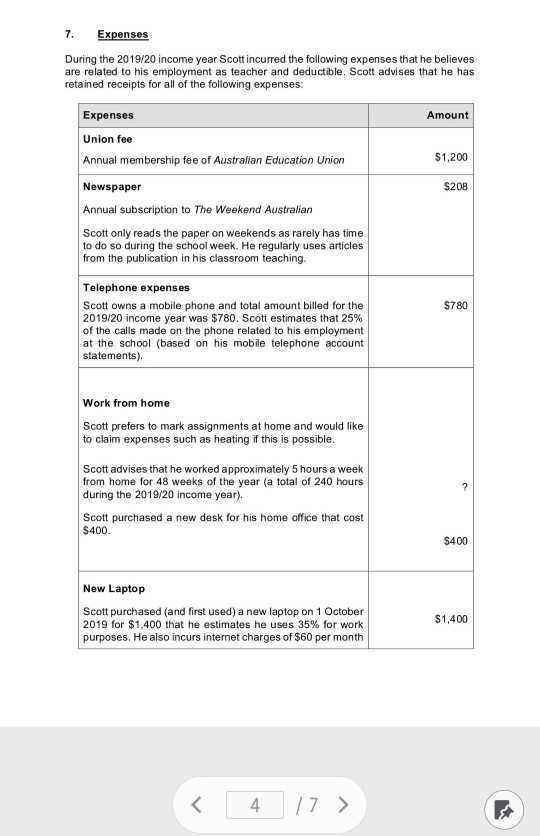
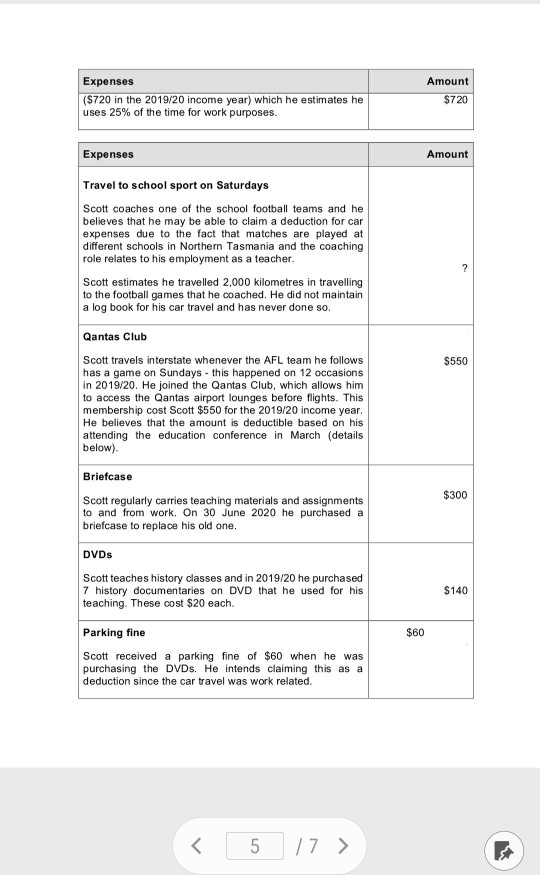
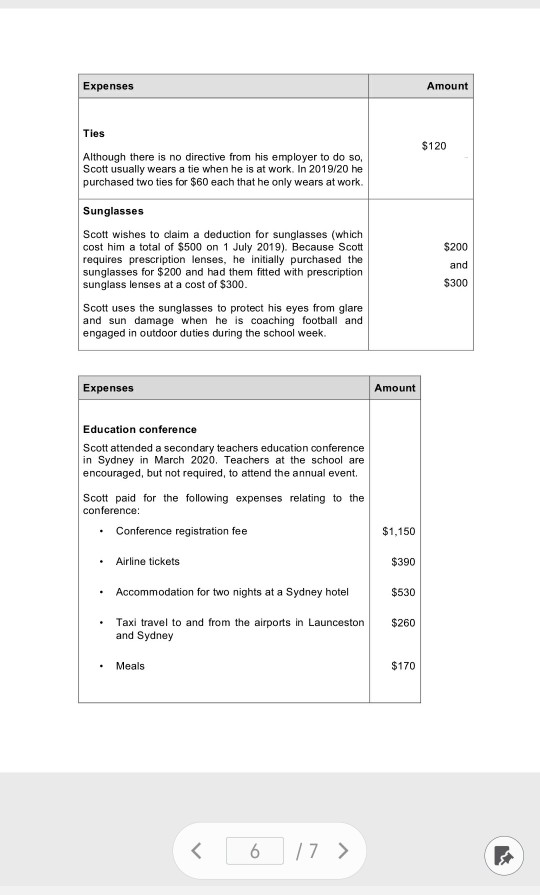
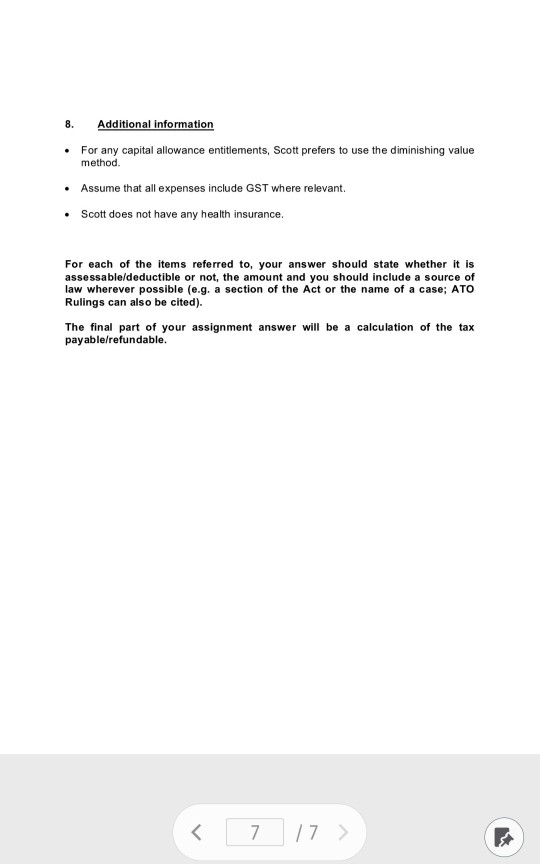
BFA714 Australian Tax Law Assignment 1 (individual) DUE DATE: Friday 28th August at 5pm CLIENT INFORMATION: General Facts: Scott Wright is 36 years old and is an Australian resident for tax purposes. Scott is an employee teacher working for Launceston Secondary College. Scott has been working as an English teacher since he completed his Diploma of Education degree fifteen years ago. He lives in a house in Newnham, is single, and has no dependents. Scott has supplied you with the information below relating to his personal income tax affairs for the year ended 30 June 2020. However, he is not certain whether everything he has provided you with is assessable or deductible. He has asked you to consider each item and determine whether it is assessable or deductible. Scott wishes to minimise his 2019/20 taxable income wherever legally possible. Assume that the amounts detailed below are all of Scott's receipts and expenditure for the 2019/20 income year, and that all of his expenses are correctly substantiated (unless otherwise stated). 1. Personal information Full Name: Date of Birth: Main occupation: Scott Wright 2 October 1983 Teacher 2. 2019/20 income tax return On 1 February 2020, Scott received an invoice (dated 30 January 2020) for $480 from 'Swift Tax Returns' for their work in completing his 2018/19 income tax return. Scott paid this on 2 March 2020. Scott's 2018/19 notice of assessment showed he had additional income tax payable of $2,030. As Scott paid this amount late (on 2 May 2020), the Australian Taxation Office imposed $189 in general interest charges (GIC), which Scott also paid on 2 May 2020 3. Salary and Wages For the entire 2019/20 income year, Scott worked as an employee teacher for Launceston Secondary College. The school provided Scott with a PAYG Payment Summary for the period 1 July 2019 to 30 June 2020, which contained the following information: Name of Payer: Launceston Secondary College ABN of Withholder: 33 145 222 757 Gross payments: $110,000 Allowances: - refer to note (a) $3,000 PAYG tax withheld: $33,200 Note: (a) The allowance (of $3,000) is made of up of the following: a phone allowance of $500 . a professional development allowance of $2,500 (to attend education conferences, workshops, etc). 2 17 > 4. Interest Scott maintains one bank account. He provides you with the following information about interest earned during the 2019/20 income year: CBA transaction account (gross interest) - refer to note (a) $15 Notes: (a) The CBA bank account is Scott's transaction account where his fortnightly pay from the school is deposited. Scott provided his tax file number (TFN) to the bank. 5. Unexpected receipts During the 2019/20 income year, Scott also received the following: (a) A $50 Myer voucher from the principal of the school. All teachers received the same gift on the last school day of 2019, and it was enclosed in a card with a personal message that thanked Scott for his excellent teaching throughout the year. (b) Scott received $120 ($115 net after deducting his $5 ticket cost) in the school's 'Melbourne Cup sweep'. He is unsure whether this should be declared in his taxable income, given that he enters this competition every year and is concerned that it might therefore be a recurrent receipt. 6. Royalty receipt Scott receives royalties from the publisher of his book "Effective history teaching", which has a recommended retail price of $35. For each book sold, Scott receives a royalty of $4 from the book publisher On 2 July 2020, Scott received a letter from the publisher stating that based on book sales for the 2019/20 financial year he is entitled to royalties of $1,060 (based on the sale of 265 books). The publisher deposited this amount directly into Scott's bank account on 30 June 2020. 7. Expenses During the 2019/20 income year Scott incurred the following expenses that he believes are related to his employment as teacher and deductible. Scott advises that he has retained receipts for all of the following expenses: Amount $1,200 Expenses Union fee Annual membership fee of Australian Education Union Newspaper Annual subscription to The Weekend Australian Scott only reads the paper on weekends as rarely has time to do so during the school week. He regularly uses articles from the publication in his classroom teaching. $208 $780 Telephone expenses Scott owns a mobile phone and total amount billed for the 2019/20 income year was $780. Scott estimates that 25% of the calls made on the phone related to his employment at the school (based on his mobile telephone account statements). Work from home Scott prefers to mark assignments at home and would like to claim expenses such as heating if this is possible. Scott advises that he worked approximately 5 hours a week from home for 48 weeks of the year (a total of 240 hours during the 2019/20 income year). Scott purchased a new desk for his home office that cost $400. ? $400 New Laptop Scott purchased (and first used) a new laptop on 1 October 2019 for $1,400 that he estimates he uses 35% for work purposes. He also incurs internet charges of $60 per month $1,400 Amount Expenses ($720 in the 2019/20 income year) which he estimates he uses 25% of the time for work purposes. $720 Expenses Amount Travel to school sport on Saturdays Scott coaches one of the school football teams and he believes that he may be able to claim a deduction for car expenses due to the fact that matches are played at different schools in Northern Tasmania and the coaching role relates to his employment as a teacher. Scott estimates he travelled 2,000 kilometres in travelling to the football games that he coached. He did not maintain a log book for his car travel and has never done so. ? $550 Qantas Club Scott travels interstate whenever the AFL team he follows has a game on Sundays - this happened on 12 occasions in 2019/20. He joined the Qantas Club, which allows him to access the Qantas airport lounges before flights. This membership cost Scott $550 for the 2019/20 income year. He believes that the amount is deductible based on his attending the education conference in March (details below). $300 Briefcase Scott regularly carries teaching materials and assignments to and from work. On 30 June 2020 he purchased a briefcase to replace his old one. DVDs Scott teaches history classes and in 2019/20 he purchased 7 history documentaries on DVD that he used for his teaching. These cost $20 each. $140 $60 Parking fine Scott received a parking fine of $60 when he was purchasing the DVDs. He intends claiming this as a deduction since the car travel was work related. 5 17 > Expenses Amount $120 Ties Although there is no directive from his employer to do so, Scott usually wears a tie when he is at work. In 2019/20 he purchased two ties for $60 each that he only wears at work. $200 Sunglasses Scott wishes to claim a deduction for sunglasses (which cost him a total of $500 on 1 July 2019). Because Scott requires prescription lenses, he initially purchased the sunglasses for $200 and had them fitted with prescription sunglass lenses at a cost of $300. Scott uses the sunglasses to protect his eyes from glare and sun damage when he is coaching football and engaged in outdoor duties during the school week. and $300 Expenses Amount Education conference Scott attended a secondary teachers education conference in Sydney in March 2020. Teachers at the school are encouraged, but not required to attend the annual event, Scott paid for the following expenses relating to the conference: Conference registration fee $1,150 Airline tickets $390 Accommodation for two nights at a Sydney hotel $530 $260 Taxi travel to and from the airports in Launceston and Sydney Meals $170 /7 > 8. Additional information For any capital allowance entitlements, Scott prefers to use the diminishing value method Assume that all expenses include GST where relevant. Scott does not have any health insurance. For each of the items referred to your answer should state whether it is assessable/deductible or not, the amount and you should include a source of law wherever possible (e.g. a section of the Act or the name of a case; ATO Rulings can also be cited). The final part of your assignment answer will be a calculation of the tax payable/refundable. BFA714 Australian Tax Law Assignment 1 (individual) DUE DATE: Friday 28th August at 5pm CLIENT INFORMATION: General Facts: Scott Wright is 36 years old and is an Australian resident for tax purposes. Scott is an employee teacher working for Launceston Secondary College. Scott has been working as an English teacher since he completed his Diploma of Education degree fifteen years ago. He lives in a house in Newnham, is single, and has no dependents. Scott has supplied you with the information below relating to his personal income tax affairs for the year ended 30 June 2020. However, he is not certain whether everything he has provided you with is assessable or deductible. He has asked you to consider each item and determine whether it is assessable or deductible. Scott wishes to minimise his 2019/20 taxable income wherever legally possible. Assume that the amounts detailed below are all of Scott's receipts and expenditure for the 2019/20 income year, and that all of his expenses are correctly substantiated (unless otherwise stated). 1. Personal information Full Name: Date of Birth: Main occupation: Scott Wright 2 October 1983 Teacher 2. 2019/20 income tax return On 1 February 2020, Scott received an invoice (dated 30 January 2020) for $480 from 'Swift Tax Returns' for their work in completing his 2018/19 income tax return. Scott paid this on 2 March 2020. Scott's 2018/19 notice of assessment showed he had additional income tax payable of $2,030. As Scott paid this amount late (on 2 May 2020), the Australian Taxation Office imposed $189 in general interest charges (GIC), which Scott also paid on 2 May 2020 3. Salary and Wages For the entire 2019/20 income year, Scott worked as an employee teacher for Launceston Secondary College. The school provided Scott with a PAYG Payment Summary for the period 1 July 2019 to 30 June 2020, which contained the following information: Name of Payer: Launceston Secondary College ABN of Withholder: 33 145 222 757 Gross payments: $110,000 Allowances: - refer to note (a) $3,000 PAYG tax withheld: $33,200 Note: (a) The allowance (of $3,000) is made of up of the following: a phone allowance of $500 . a professional development allowance of $2,500 (to attend education conferences, workshops, etc). 2 17 > 4. Interest Scott maintains one bank account. He provides you with the following information about interest earned during the 2019/20 income year: CBA transaction account (gross interest) - refer to note (a) $15 Notes: (a) The CBA bank account is Scott's transaction account where his fortnightly pay from the school is deposited. Scott provided his tax file number (TFN) to the bank. 5. Unexpected receipts During the 2019/20 income year, Scott also received the following: (a) A $50 Myer voucher from the principal of the school. All teachers received the same gift on the last school day of 2019, and it was enclosed in a card with a personal message that thanked Scott for his excellent teaching throughout the year. (b) Scott received $120 ($115 net after deducting his $5 ticket cost) in the school's 'Melbourne Cup sweep'. He is unsure whether this should be declared in his taxable income, given that he enters this competition every year and is concerned that it might therefore be a recurrent receipt. 6. Royalty receipt Scott receives royalties from the publisher of his book "Effective history teaching", which has a recommended retail price of $35. For each book sold, Scott receives a royalty of $4 from the book publisher On 2 July 2020, Scott received a letter from the publisher stating that based on book sales for the 2019/20 financial year he is entitled to royalties of $1,060 (based on the sale of 265 books). The publisher deposited this amount directly into Scott's bank account on 30 June 2020. 7. Expenses During the 2019/20 income year Scott incurred the following expenses that he believes are related to his employment as teacher and deductible. Scott advises that he has retained receipts for all of the following expenses: Amount $1,200 Expenses Union fee Annual membership fee of Australian Education Union Newspaper Annual subscription to The Weekend Australian Scott only reads the paper on weekends as rarely has time to do so during the school week. He regularly uses articles from the publication in his classroom teaching. $208 $780 Telephone expenses Scott owns a mobile phone and total amount billed for the 2019/20 income year was $780. Scott estimates that 25% of the calls made on the phone related to his employment at the school (based on his mobile telephone account statements). Work from home Scott prefers to mark assignments at home and would like to claim expenses such as heating if this is possible. Scott advises that he worked approximately 5 hours a week from home for 48 weeks of the year (a total of 240 hours during the 2019/20 income year). Scott purchased a new desk for his home office that cost $400. ? $400 New Laptop Scott purchased (and first used) a new laptop on 1 October 2019 for $1,400 that he estimates he uses 35% for work purposes. He also incurs internet charges of $60 per month $1,400 Amount Expenses ($720 in the 2019/20 income year) which he estimates he uses 25% of the time for work purposes. $720 Expenses Amount Travel to school sport on Saturdays Scott coaches one of the school football teams and he believes that he may be able to claim a deduction for car expenses due to the fact that matches are played at different schools in Northern Tasmania and the coaching role relates to his employment as a teacher. Scott estimates he travelled 2,000 kilometres in travelling to the football games that he coached. He did not maintain a log book for his car travel and has never done so. ? $550 Qantas Club Scott travels interstate whenever the AFL team he follows has a game on Sundays - this happened on 12 occasions in 2019/20. He joined the Qantas Club, which allows him to access the Qantas airport lounges before flights. This membership cost Scott $550 for the 2019/20 income year. He believes that the amount is deductible based on his attending the education conference in March (details below). $300 Briefcase Scott regularly carries teaching materials and assignments to and from work. On 30 June 2020 he purchased a briefcase to replace his old one. DVDs Scott teaches history classes and in 2019/20 he purchased 7 history documentaries on DVD that he used for his teaching. These cost $20 each. $140 $60 Parking fine Scott received a parking fine of $60 when he was purchasing the DVDs. He intends claiming this as a deduction since the car travel was work related. 5 17 > Expenses Amount $120 Ties Although there is no directive from his employer to do so, Scott usually wears a tie when he is at work. In 2019/20 he purchased two ties for $60 each that he only wears at work. $200 Sunglasses Scott wishes to claim a deduction for sunglasses (which cost him a total of $500 on 1 July 2019). Because Scott requires prescription lenses, he initially purchased the sunglasses for $200 and had them fitted with prescription sunglass lenses at a cost of $300. Scott uses the sunglasses to protect his eyes from glare and sun damage when he is coaching football and engaged in outdoor duties during the school week. and $300 Expenses Amount Education conference Scott attended a secondary teachers education conference in Sydney in March 2020. Teachers at the school are encouraged, but not required to attend the annual event, Scott paid for the following expenses relating to the conference: Conference registration fee $1,150 Airline tickets $390 Accommodation for two nights at a Sydney hotel $530 $260 Taxi travel to and from the airports in Launceston and Sydney Meals $170 /7 > 8. Additional information For any capital allowance entitlements, Scott prefers to use the diminishing value method Assume that all expenses include GST where relevant. Scott does not have any health insurance. For each of the items referred to your answer should state whether it is assessable/deductible or not, the amount and you should include a source of law wherever possible (e.g. a section of the Act or the name of a case; ATO Rulings can also be cited). The final part of your assignment answer will be a calculation of the tax payable/refundable.
Step by Step Solution
There are 3 Steps involved in it
Step: 1

Get Instant Access to Expert-Tailored Solutions
See step-by-step solutions with expert insights and AI powered tools for academic success
Step: 2

Step: 3

Ace Your Homework with AI
Get the answers you need in no time with our AI-driven, step-by-step assistance
Get Started


